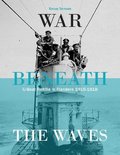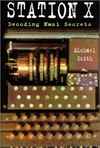Convoy is to Scatter
Broome, John Egerton
1972, William Kimber, London
ISBN 0718303326
Hardcover, 232 pages, 3 photos, 23 illustrations, 4 charts
| Type. | General history/Personal narrative |
| Pros. | Very effective prose style; brilliant use of primary source materials, personal view of events unequalled in any account, published or otherwise. |
| Cons. | More material on the trial and its origins and outcomes would enrich it. A man and a story sorely in need of a full, critical, and deep biography. Co-Authorship, anyone? |
| Rating. |  |
This is a seminal text. It is a unique employment of primary sources about one of the few remaining really controversial events of the Second World War. It is also a brilliant autobiography, written in a highly effective style. It is furthermore a solid, comprehensively researched yet restrained account of a famous disaster, and a resulting libel case also famous in its time.
The scattering and decimation of arctic convoy PQ-17 in July 1942 remains one of the most infamous events of the Second World War. Many books have been written from naval, merchant-naval, and intelligence perspectives, with varying degrees of accuracy, tact, and fervour. This book is the result of one such lapse of tact and accuracy. David Irving's highly-critical 1968 account landed him in a libel case, brought by Broome over comments and statements on his performance. Irving's criticism had not been limited to Broome, indeed Irving had been critical of everyone - Broome, merchant captains and seamen, the German and British naval commands, and individual German U-boat commanders as well. Broome, of the few still alive, took Irving to task, and won £30,000 in damages. This book then set out for the public his own view of the events, after a short, thoughtful and revealing autobiography. This alone was more original and effective than almost all others written of the RN from 1900 onwards. Class, gender, tactics, strategy, culture and personality were all elucidated in a highly entertaining style.
Upon this was built a different second half. The chief advance of Broome's account, aside from his winning prose, considerable humour, and prominent position at the sharp end, was his employment of the actual naval signals sent to and from the convoy. These were among the few survivors of more than two tons of accumulated signals made in the RN during the war, much of the pile having been destroyed or recycled after use by official historians. We can see, for once, distinct from Broome's narrative and opinions, what was actually said, when, and by whom. This may not radically affect the outcome of the book or our opinions, but it did destroy misconceptions and errors, and prevent further embellishments of the tale. It proved Broome's case conclusively, and did much to rationalise and cool the simmering debate. The RN had quietly admitted in 1957 that the scattering was ordered by Admiral Pound in Whitehall, but it was not until 1989 that the Official History of British Intelligence really clarified the account. Even then, Hinsley's lengthy opinion tended to defend Pound. His grounds were that little difference would have resulted had the convoy not scattered, and Tirpitz intercepted PQ-17 under Luftwaffe defences, in confined waters, beyond the assistance of RN capital ships. Several historians have countered Hinsley since.
Further advantages are Broome's own cartoons and maps, as well as a few well-chosen photographs including rare still frames from amateur cine-camera by another captain. Broome was well-known in the RN for these apposite and effective comic images, many of which were used for official purposes. Until the unlikely event of an account from the German naval and aircraft perspective, we are left only with such brilliant employments of sources, memory and style as Broome's, and the altogether more mendacious re-employment of fact, myth, and purpose by such men as Irving.
The reviewer welcomes your comments on this review.
Review written by Ian Campbell.
Published on 1 Dec 2000.
This title is highly recommended.
Return to our main review page.



